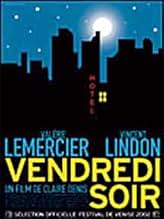Vendredi soir
- 2002
- Tous publics
- 1h 30m
IMDb RATING
6.7/10
2.2K
YOUR RATING
It's Friday night--she's moving in with her boyfriend tomorrow--so she goes out, but gets stuck in traffic--where she meets a handsome stranger.It's Friday night--she's moving in with her boyfriend tomorrow--so she goes out, but gets stuck in traffic--where she meets a handsome stranger.It's Friday night--she's moving in with her boyfriend tomorrow--so she goes out, but gets stuck in traffic--where she meets a handsome stranger.
- Awards
- 1 win & 3 nominations total
Florence Loiret Caille
- La jeune fille du flipper
- (as Florence Loiret-Caille)
Featured reviews
This movie is not for the sort of casual movie-goer who must have a plot driven, dialogue heavy entertainment vehicle in order to be satisfied. This film is typical Denis: intensely visual, with sparse dialogue and a very minimal plot.
The premise of the film is a simple one. A woman about to move in with her lover is caught in a traffic jam during a Paris transit strike. She picks up a stranger, and they have a one-nighter.
The film's focus is the little things that make up sexual attraction, the situations, the glimpses, the attitudes, the predilections, etc. It manages to present this in an almost completely visual way without ever becoming dull, pretentious, or difficult to watch. The film has a minute logic to it which manages to pull the viewer along from scene to scene using humor, suspense, and a good deal of empathy for the central character.
This film invites one to reflect on the way in which sex relates to the variety of life's anxieties: anxieties over self-image, anxieties over one's future, anxieties over one's significance, etc. It also provides an interesting vantage point from which to view the over-romanticized over-serious status that sex is given in main-stream American cinema.
Go to this film with the intent of viewing a wonderful piece of art. There is some work required on the viewer's part, but it's worth the effort.
The premise of the film is a simple one. A woman about to move in with her lover is caught in a traffic jam during a Paris transit strike. She picks up a stranger, and they have a one-nighter.
The film's focus is the little things that make up sexual attraction, the situations, the glimpses, the attitudes, the predilections, etc. It manages to present this in an almost completely visual way without ever becoming dull, pretentious, or difficult to watch. The film has a minute logic to it which manages to pull the viewer along from scene to scene using humor, suspense, and a good deal of empathy for the central character.
This film invites one to reflect on the way in which sex relates to the variety of life's anxieties: anxieties over self-image, anxieties over one's future, anxieties over one's significance, etc. It also provides an interesting vantage point from which to view the over-romanticized over-serious status that sex is given in main-stream American cinema.
Go to this film with the intent of viewing a wonderful piece of art. There is some work required on the viewer's part, but it's worth the effort.
This film resists all that is wrong with blockbuster cinema, totally refusing to offer straight-forward, passivity-inducing narrative structures. It is one of the most book-like films you are likely to see, taking its time to develop the central characters in manner that leaves them open to determination by the audience's imagination. It is an erotic film that has no climax. It is a film that engages in life rather than distracts us from it.
This is an immensely subtle film that uses a broad range of cinematic techniques so you should definitely see it on a big screen. In fact, I wouldn't even bother seeing it on TV, so diminished would its impact be.
This is an immensely subtle film that uses a broad range of cinematic techniques so you should definitely see it on a big screen. In fact, I wouldn't even bother seeing it on TV, so diminished would its impact be.
This was a damn good movie. Very different, the closest movie that comes to the feel and over all effect is The Loss of Sexual Innocence. Movies such as this catch many off guard because they don't follow the de facto movie format. Meaning, an event happens, people react to said event, drama, conclusion, resolution.
This movie takes a totally different approach, and that's what makes it shine. This movie defies being labeled as a movie altogether. People say this movie is boring, that nothing happens, there are almost no words. They'd be right, there is no real drama, conclusion, resolution. I don't believe that's what this movie is even about.
From the opening moments of the Paris rooftops I knew I was in for something special. The long shots, the turning off of lights, the gazes at the Paris skyline. This was a visual feast with poetic credentials, and I expected as much.
Folks, this movie was not about Jean and Laure. I believe thats where all the critical flack stems from. This movie isn't about a brief encounter that is over by sunrise. The plot that you all speak of, that's secondary.
The movie tends to focus on their surroundings more so then them. A cluttered car, a heater, traffic, boxes. A best example of this is their skin, during the sex scenes there are close ups of their skin rather then showing them making love. As if the plot, in this case, making love, is secondary to the poetic element of the story.
In any given event, the surroundings are just as important as the story itself. This movie displays that perfectly. That is the purpose of this movie, that is it's beauty, that is what it is about.
If this movie is about the surroundings rather then a plot or story, then what would be the purpose of showing rooftops, skin, lamps, boxes? Because is it life, and it is poetic and beautiful. What is the purpose of a rose? Why take a picture of it, or give it to someone? A rose simply is, this movie simply is. The nuances of life deserve appreciation and this movie pays homage to that fact. That is what this movie is about.
It is life, it is the beauty of everything around you.
This movie takes a totally different approach, and that's what makes it shine. This movie defies being labeled as a movie altogether. People say this movie is boring, that nothing happens, there are almost no words. They'd be right, there is no real drama, conclusion, resolution. I don't believe that's what this movie is even about.
From the opening moments of the Paris rooftops I knew I was in for something special. The long shots, the turning off of lights, the gazes at the Paris skyline. This was a visual feast with poetic credentials, and I expected as much.
Folks, this movie was not about Jean and Laure. I believe thats where all the critical flack stems from. This movie isn't about a brief encounter that is over by sunrise. The plot that you all speak of, that's secondary.
The movie tends to focus on their surroundings more so then them. A cluttered car, a heater, traffic, boxes. A best example of this is their skin, during the sex scenes there are close ups of their skin rather then showing them making love. As if the plot, in this case, making love, is secondary to the poetic element of the story.
In any given event, the surroundings are just as important as the story itself. This movie displays that perfectly. That is the purpose of this movie, that is it's beauty, that is what it is about.
If this movie is about the surroundings rather then a plot or story, then what would be the purpose of showing rooftops, skin, lamps, boxes? Because is it life, and it is poetic and beautiful. What is the purpose of a rose? Why take a picture of it, or give it to someone? A rose simply is, this movie simply is. The nuances of life deserve appreciation and this movie pays homage to that fact. That is what this movie is about.
It is life, it is the beauty of everything around you.
Claire Denis sure knows the French woman's mentality. She is very sly in presenting us this story, that on the surface tells us one thing, but deep down, it has nothing to do what we are actually watching.
The transit strike plot, with Laure sitting in traffic and going nowhere, is played too long. We all get the idea of the boredom and frustration of the driver caught in similar circumstances. That part of the film can drive the viewer nuts, since nothing happens.
Laure doesn't feel any remorse into picking up Jean, who is obviously stranded, or is he?. Their conversation doesn't reveal anything, yet, one can feel where this is leading to: somewhere where Laure and Jean can copulate to their hearts content.
The clue of what's to come takes place after they have an espresso at the cafe. Jean asks for change to go downstairs to the vending machine for a 4 condom pack. Oh la la... Jean is not a casual sex offender, he must protect himself, as well as the woman he takes to bed. Casual meetings such as these can be very dangerous!
The scenes in the hotel are well staged. In fact, there is nothing shocking, or done in bad taste. When Laure and Jean are making out, their behavior is very chaste, without French kisses, (I wonder if Pres. Bush would call them Liberty kisses?...) is a let down. But Jean and Laure do it very stylishly and with decorum.
Jean, obviously, is not a one-woman man. After all he has more condoms in his pocket and when he is in the pizzeria, he spots another woman who makes it known she wants to play with him downstairs.
At the end of the film we watch Laure leave the hotel room running into the deserted streets with a grin on her face. She'll go now to her own lover as though nothing had ever happened that night. She is a woman empowered by her own will to have fun, yet not take it too seriously, or hurt anyone. Perhaps she's laughing at her own sense of adventure having done something that perhaps no one will ever know.
Both of the principals are very effective. Veronique Lemercier and Vincent Lindon play very well together. The director is perhaps telling us that there is still hope for all of us, non movie star types, to have fun and meet a partner for the night, have great sex on the next transit strike, if we are in Paris.
The transit strike plot, with Laure sitting in traffic and going nowhere, is played too long. We all get the idea of the boredom and frustration of the driver caught in similar circumstances. That part of the film can drive the viewer nuts, since nothing happens.
Laure doesn't feel any remorse into picking up Jean, who is obviously stranded, or is he?. Their conversation doesn't reveal anything, yet, one can feel where this is leading to: somewhere where Laure and Jean can copulate to their hearts content.
The clue of what's to come takes place after they have an espresso at the cafe. Jean asks for change to go downstairs to the vending machine for a 4 condom pack. Oh la la... Jean is not a casual sex offender, he must protect himself, as well as the woman he takes to bed. Casual meetings such as these can be very dangerous!
The scenes in the hotel are well staged. In fact, there is nothing shocking, or done in bad taste. When Laure and Jean are making out, their behavior is very chaste, without French kisses, (I wonder if Pres. Bush would call them Liberty kisses?...) is a let down. But Jean and Laure do it very stylishly and with decorum.
Jean, obviously, is not a one-woman man. After all he has more condoms in his pocket and when he is in the pizzeria, he spots another woman who makes it known she wants to play with him downstairs.
At the end of the film we watch Laure leave the hotel room running into the deserted streets with a grin on her face. She'll go now to her own lover as though nothing had ever happened that night. She is a woman empowered by her own will to have fun, yet not take it too seriously, or hurt anyone. Perhaps she's laughing at her own sense of adventure having done something that perhaps no one will ever know.
Both of the principals are very effective. Veronique Lemercier and Vincent Lindon play very well together. The director is perhaps telling us that there is still hope for all of us, non movie star types, to have fun and meet a partner for the night, have great sex on the next transit strike, if we are in Paris.
Claire Denis uses close-ups better than anybody since Sergio Leone. Agnes Godard is amazing. A Denis film almost always has a human warmth few other filmmakers achieve with their films, even if it's their intention to do so. All these qualities are present in "Vendredi soir", yet I felt it was significantly weaker than the three Denis films I had already seen: "Chocolat", "Nenette et Boni", and "Trouble Every Day". It's not that the film is 'slight' or that it doesn't have much narrative drive that bothered me, either, but that it never took on the sort of gravity I thought it should have. Moreover, the film falls apart toward the end, when it should have come together. The opening stages of the film, with Godard's camera taking us through Paris were absolutely gorgeous, the first few scenes after the two main characters meet were great, especially the brilliant impressionistic montage after Jean unexpectedly takes over driving Laure's car (accompanied by a Hitchcockian musical score), but when they actually get together and have sex the film just falls apart. Here's a film which is technically brilliant (direction, cinematography, acting, Dickon Hinchliffe's great debut score), formally interesting, but which just doesn't have enough in it to justify even its short length.
- How long is Friday Night?Powered by Alexa
Details
Box office
- Gross US & Canada
- $156,918
- Opening weekend US & Canada
- $9,381
- May 25, 2003
- Gross worldwide
- $609,542
- Runtime1 hour 30 minutes
- Color
- Sound mix
- Aspect ratio
- 1.85 : 1
Contribute to this page
Suggest an edit or add missing content



























